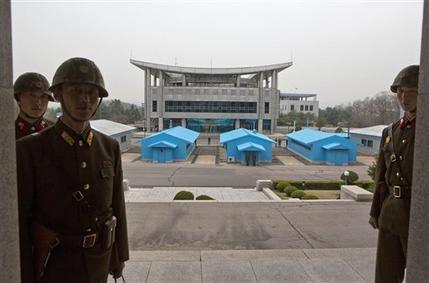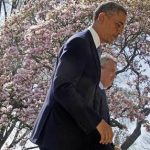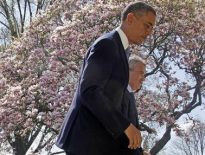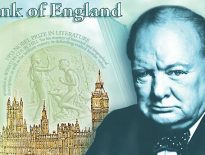PYONGYANG, North Korea (AP) — After weeks of fiery rhetoric, military posturing and threats that it’s willing to strike back hard if provoked, North Korea appears to be taking a bit of a breather. The U.S.-South Korea war games it despises are winding down, and feelers are out in diplomatic circles that it might be best to open up some avenue for dialogue. If that sounds familiar, it should – it’s a pattern that has been repeated for decades.

So here’s the question: Can we talk?
From back-door channels to multinational conferences, dialogue has repeatedly been tried in a long-running effort to get North Korea to put the brakes on its development of nuclear weapons. Generally, hopes sputter and fade when North Korea’s talking partners are presented with what they consider impossible demands. North Korea, meanwhile, has moved slowly but surely ahead with its nuclear program.
The current crisis has played out with the added uncertainty of just how far North Korea’s new leader, Kim Jong Un, is willing to take the brinksmanship.
Amid continued fears it may test-launch a mid-range missile, North Korea two weeks ago opened the door, just a tiny crack, to talks. First it laid out a list of conditions for dialogue. Then it eased up on the near-daily war threats that had characterized its public statements, possibly signaling a willingness to dial the tensions back, particularly after the U.S.-South Korea drills, which were set to end Tuesday.
In a subtle shift in tone, North Korea issued these preconditions on April 16 for resuming talks: the lifting of U.N. sanctions, the end of the U.S.-South Korea military drills, the withdrawal of U.S. nuclear strike capabilities from the region and a halt to criticism of North Korea. It then reiterated a demand to South Korea to apologize for offending its leadership before any talk of dialogue to defuse tensions.
South Korea’s Foreign Ministry called North Korea’s demands illogical, but U.S. Secretary of State John Kerry said it was “at least a beginning,” though “not acceptable, obviously.” The U.S. remains open to “authentic and credible negotiations,” White House spokesman Josh Earnest told reporters soon afterward, but he noted that the U.S. has not seen any commitment from North Korea that it is willing to end its nuclear program.
Getting North Korea to do that seems highly unlikely, especially now that it is claiming nuclear weapons are an essential part of its national defense. But advocates of diplomacy say it still must play a role. Obama and South Korea’s President Park Geun-hye are scheduled to meet in Washington next week to discuss their policies toward Pyongyang.
“A new diplomatic offensive, which might open an avenue to peaceful resolution of the current crisis, would demonstrate that the United States understands that exercising leadership means more than just flexing military muscle,” Joel Wit, a former State Department arms control negotiator, and Jenny Town, a research associate at the U.S.-Korea Institute at Johns Hopkins’ School of Advanced International Studies, recently wrote in an article posted online by Foreign Policy magazine. “What’s the alternative? More threats, more instability and possibly even a war that nobody wants.”
It remains an open debate what North Korea’s intentions were to begin with.
Perhaps North Korea was trying to establish leader Kim Jong Un as a tough guy not to be taken lightly in future negotiations or any efforts to impose further sanctions in the future. Maybe it was aimed at the North Koreans themselves, creating a sense of unity against an outside enemy to bolster Kim’s footing at home. Most experts agree that it was not about seriously preparing to start a war or taking off the table the often-stated desire for talks with the United States to sign a formal peace treaty.
But if negotiations are its goal, it may have shot itself in the foot.
“The recent barrage of pronouncements from Pyongyang has left an indelible negative impression in the minds of the American people, which will be hard to undo through any exchanges or negotiations any time soon, especially as long as the current regime stays in power in Pyongyang,” Alexandre Mansourov, a visiting scholar at the School of Advanced International Studies at Johns Hopkins university, wrote in a recent blog post.
Pyongyang has also taken an economic hit for its stance.
Operations at the Kaesong factory park – a joint endeavor with South Korea just north of the Demilitarized Zone – have been suspended since early April, when the North withdrew its 53,000 workers. With Pyongyang refusing to allow South Koreans to cross the border to bring food and supplies, Seoul was planning to pull the remaining 50 South Koreans from Kaesong on Monday, emptying the complex for the first time since its 2004 opening.
North Korea has its own well-honed version of what’s behind the problems on the Korean Peninsula and how that justifies its actions, no matter what the outside world may say. As it ratcheted up tensions since a nuclear test in February, it made one thing very clear: it’s sticking to its story.
To the suggestion it has brought international ire down upon its own shoulders by pursuing nuclear weapons, its response is that the blame lies with the United States, its hostile, nuclear-armed enemy. To questions about its poverty, the blame is placed on U.N. sanctions. Missile and nuclear tests? They are justified self-defense.
Even something as mundane as blackouts at Pyongyang’s bowling alley quickly become an example of the nation’s resolve not to be cowed by pressure.
When asked why the power had gone out briefly a few days before, catching many bowlers in mid-swing, Jong Won Gol, a manager at Gold Lane bowling alley, said North Korea wouldn’t have electricity problems if the United States had lived up to its promise to help build nuclear power plants. Washington says that deal fell apart because Pyongyang reneged on its pledges.
Jong also launched into a description of how North Korea, like any other nation, has the right to build rockets for space exploration. It was a rocket launch, condemned as a pretext for testing missile technology, that led to the most recent U.N. sanctions.
“My people cannot accept these sanctions,” he concluded. “If we are called to the front, we will be happy to go.”





